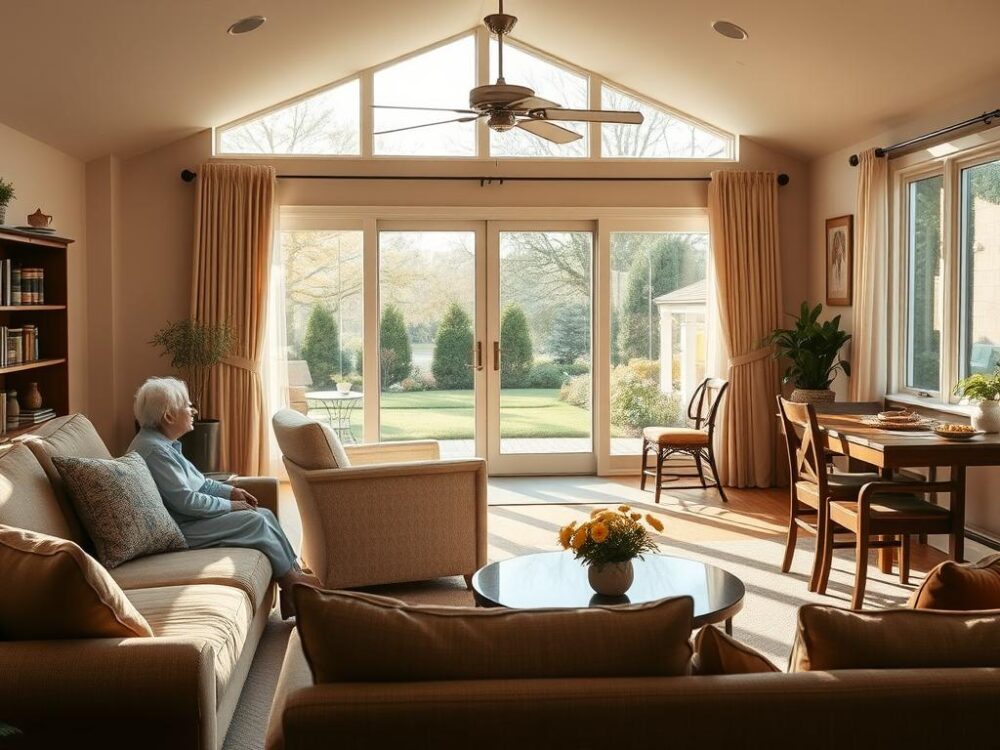
Home Help for Seniors: Trusted Caregivers for Elderly Care
May 13, 2024Home Care Agencies Near Me: Find Reputable Local Providers
May 13, 2024At Extended Home Care, we prioritize delivering high-quality private care and in-home assistance. We believe in the importance of personalized support for each individual’s well-being, and our team is proud to provide exceptional care.
We strive to build genuine connections with those we serve, treating everyone like family. We create customized respite care plans tailored to each person’s needs, including senior care and Alzheimer’s care. This approach helps our clients and their families feel independent, comfortable, and at peace.
Understanding Private Care
Private care is a specialized form of senior care that offers personalized support at home. It focuses on non-medical assistance to help older adults maintain their independence and overall well-being.
What is Private Care?
Private care provides tailored support in the home, assisting with basic daily tasks such as dressing, grooming, bathing, toileting, and mobility.
Difference Between Personal Care and Companion Care
In private care, there are two main types: personal care and companion care. While both offer essential support, they serve different purposes.
Personal Care
involves direct assistance with Activities of Daily Living (ADLs), which helps seniors maintain their independence and dignity. This type of care ensures that seniors receive physical support as they navigate daily tasks.
Companion Care
provides companionship and emotional support. It includes tasks such as preparing meals, cleaning, and driving seniors to appointments. The key distinction is that personal care can offer physical assistance with ADLs, whereas companion care does not involve physical tasks.
Benefits of Private Care
Choosing private care is often motivated by a desire to provide the best for our loved ones. The primary goal is to keep them healthy, happy, and independent. Receiving care at home from skilled professionals offers numerous benefits, allowing seniors and individuals with special needs to thrive in their own environments.
Maintaining Independence and Aging in Place
The biggest advantage of private care is the opportunity to stay in one’s home while receiving necessary support. This means avoiding relocation and allowing seniors to retain their daily routines while enjoying the comfort of their familiar surroundings. This aspect is especially beneficial for those experiencing the challenges of ageing or managing long-term illnesses.
Personalized Assistance Tailored to Your Needs
Private care stands out for its personalized support. Care plans are developed with the family’s input to suit the client’s unique needs. This can include assistance with daily tasks, medication management, or care for specific conditions such as Alzheimer’s. The focus is on safety, comfort, and ensuring clients feel well-cared for.
Emotional Support and Companionship
In addition to physical assistance, having someone present for emotional support is crucial. Companion services from private caregivers help alleviate loneliness and provide a shoulder to lean on. This type of companionship is invaluable, enhancing not only physical health but also mental well-being, ultimately improving the quality of life for elderly care recipients.
Combining in-home assistance, personalized support, and companion services creates a comprehensive care solution. It enables individuals to maintain their independence while receiving the necessary help to thrive in their homes.
Services Offered by Private Care Providers
Private care providers offer many services to help with daily life. They ensure you get the support you need in your home, keeping you independent, comfortable, and safe where you know best.
Assistance with Activities of Daily Living (ADLs)
Private care is extensive and includes helping with daily tasks, such as dressing, grooming, bathing, toileting, and moving around. Caregivers help your loved one with personal care, moving around, or looking their best. They do this with kindness and respect.
Meal Preparation and Nutrition Support
Eating well is vital to staying healthy, and private care providers know this. They help prepare meals that are not just good but good for you. They plan menus, shop for food, and cook meals that fit your diet.
Caregivers also teach you about healthy eating and help if you have special diet needs.
Light Housekeeping and Household Chores
Keeping your home neat can get challenging with age or if you can’t move as quickly. That’s where private care comes in with cleaning help. They tackle things like laundry, changing sheets, and general cleaning. They also do chores like shopping or straightening up to keep your home cosy and safe.
Private care providers can also help with extra things like getting around, remembering medicine, and enjoying company. This ensures that all your needs are met every day.
Private Care for Specific Conditions
Personalized private care is essential for individuals with specific health needs, as it provides tailored in-home assistance. This ensures that each person receives the unique support they require.
Dementia and Alzheimer’s Care
Caring for a family member with dementia or Alzheimer’s can be challenging. Fortunately, private care services are available to alleviate some of this burden. They offer compassionate support and follow established care routines to keep patients safe and calm.
Post-surgery and Injury Recovery Care
Proper care is crucial for recovery after surgery or an injury. Specialized non-medical caregivers can assist with mobility, medication management, and rehabilitation plans, enabling individuals to heal comfortably at home.
Chronic Illness and Disability Support
Living with a chronic illness or disability presents various challenges. However, appropriate in-home assistance can significantly enhance the quality of life. Care providers customize their support to help manage conditions, offer companionship, and address daily needs, allowing those with chronic issues or disabilities to thrive at home.
When families collaborate with trusted private care teams, their loved ones receive the right care delivered with compassion, expertise, and a focus on improving their quality of life.
Choosing a Private Care Provider
Choosing a private care provider for a loved one is very important. Make sure they offer the best in-home assistance and personalized support. Good providers are open, have the proper accreditations, and have well-trained and experienced caregivers.
Accreditations and Certifications
Look for private care agencies with good accreditations. These show they follow strict quality and safety rules. For example, Caresify is accredited by the Joint Commission. This means they meet high standards in non-medical caregiving and companion services.
Caregiver Training and Experience
The skills and experience of caregivers are crucial. Caregivers with the proper caregiver training and expertise can offer top-quality care. Experienced caregivers know how to handle different situations and can change to meet your family member’s needs.
Personalized Care Plans
Good private care providers know that every person is different. They should provide care plans that are made for each person’s specific needs and goals. These plans ensure your loved one gets the best care and support for their well-being and quality of life.
Private Care
At the core of private care is a strong focus on personalized support. It’s designed for everyone’s special needs, helping people stay independent and feel their best.
Types of Private Care Services
Private care providers have many services to pick from. This includes:
- Personal care is for daily activities like bathing, dressing, and getting around.
- Companion care: It focuses on social time and helping with small tasks.
- Dementia and Alzheimer’s care: Care for those with memory problems, ensuring they’re safe and comfortable.
- Respite care: Gives family caregivers a break while their loved one still gets excellent care.
Customizing Private Care Plans
Every client’s situation is different, so private care plans are made to fit their specific needs and wishes. This thoughtful method helps clients enjoy more independence and a better quality of life.
Hourly or Live-In Care Options
Private care options are also flexible with care times and budgets. You can choose hourly care or live-in care. The first means a caregiver visits different hours, and the second is full-time support at home.
With so many private care services and the chance to personalize, families can find what fits their needs. This leads to better living and peace for all involved.
Paying for Private Care
Thinking about getting private care at home means you need to consider money. Luckily, there are many ways to help pay for these needed personalized support services.
Long-Term Care Insurance
People often use long-term care insurance for things like companion services at home. This kind of insurance can cover different types of private care, depending on the plan.
Veterans Benefits
If you or your spouse are veterans, the Department of Veterans Affairs might be able to help. They offer benefits for in-home assistance. Checking out these long-term care insurance options could show that it’s easier to get financial help.
Private Pay Options
- Some people pay for private care themselves if they don’t have insurance.
- Private care providers often have ways to make paying more accessible, like plans or using credit cards.
- It would be best to talk to the care provider directly about paying. They might have ways to help that suit you.
Caregiver Support and Resources
Being a private care provider for someone you love brings joy but can also be challenging. People who provide in-home assistance know how tough it is and help out. They offer support made just for you and share resources to lighten your load.
Respite Care for Family Caregivers
Respite care lets main caregivers take a break from their daily tasks. This break is crucial to avoid getting too exhausted and makes self-care possible. Both the caregiver and the care receiver benefit from this time off.
Caregiver Education and Training
Good in-home assistance providers see how important it is to teach family caregivers. They help family members learn the right skills and knowledge. Their caregiver education and training cover areas like knowing specific conditions and how to communicate effectively.
- Understanding specific conditions or disabilities
- Effective communication techniques
- Proper transfer and mobility assistance
- Medication management
- Stress management and self-care strategies
These lessons help caregivers do a better job and take care of themselves too.
Private care providers are true helpers by providing respite care, caregiver support, and training. They ensure that family caregivers have everything they need to offer top care while taking care of their own physical and mental health.
Transitioning to Private Care
Transitioning a loved one to private care is complex and hard. It’s crucial to make the change carefully. We must ensure their needs and safety come first.
Assessing Your Loved One’s Needs
The first step is figuring out what your loved one needs. Look into their physical, mental, and emotional needs. This will help you decide what kind of help they require.
Think about their daily life needs, like getting dressed and bathing. Also, I want to see how well they can move and think. This step is vital for planning their care.
Communicating with Family Members
It is very important to talk openly with the family and include everyone in the talks and decisions. This helps avoid problems and makes the move to private care smoother.
When everyone is on the same page, it shows in dealing with the change. Keeping communication open helps your loved one feel supported. It also ensures that everyone understands their needs.
Preparing the Home Environment
Getting the home ready is critical for a smooth transition. You might need to add or change things like grab bars or ramps. Think of ways to make the home safe and easy to move around.
This includes making the home safe for them. Adding safety items like grab bars or anti-slip floors can significantly help. They reduce accidents and boost their independence.

The move to private care can go smoothly by carefully assessing their needs, talking openly with the family, and getting the home ready. This approach keeps your loved one’s well-being and happiness in focus.
Private Care Agencies and Providers
Looking for in-home assistance for yourself or a loved one offers choices. Families can pick between local or national private care providers. It’s vital to choose the right care agency and caregiver. This choice shapes the care’s quality and the whole experience.
Local and National Providers
Local care agencies understand their community and use this to offer in-home assistance that fits every person’s needs. National care providers may provide more services and better training for caregivers, which can lead to the same quality of care in different places.
Vetting and Selecting a Provider
Choosing a care provider, whether local or national, requires careful vetting. You should check their background, experience, and reputation. You should also see their licenses, certifications, and insurance. Talking to their past clients and reading their reviews helps you understand how good their care is and what they offer.
Building a Relationship with Your Caregiver
After picking a private care provider, building a good relationship with your caregiver is crucial. Good communication, trust, and respect matter a lot. They improve the care you get. Set clear plans and talk openly about any concerns or changes that need to be made.
Conclusion
If you want to stay independent and continue living at home, private care services can help. They meet your needs, whether it’s help with daily tasks or special care for dementia and Alzheimer’s. In-home assistance gives personalized support that focuses on your safety, comfort, and health.
Non-medical caregiving has a lot to offer. Services include companion care for support and respite care to give family caregivers a rest. Choosing a trusted provider like Caresify, which the Joint Commission recognizes, means your family gets top-notch care from skilled and caring experts.
Private care lets you live your way, promoting independence and dignity at home. By forming a solid bond with a caregiver, families can rest easy. They know their loved ones are well taken care of. This way, everyone can enjoy their older years with happiness and contentment.




